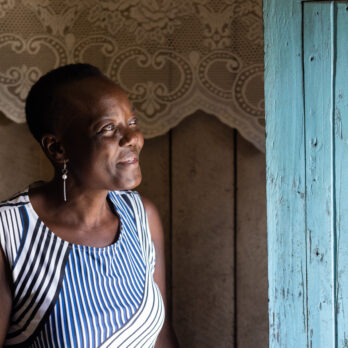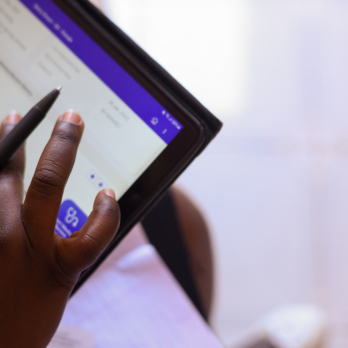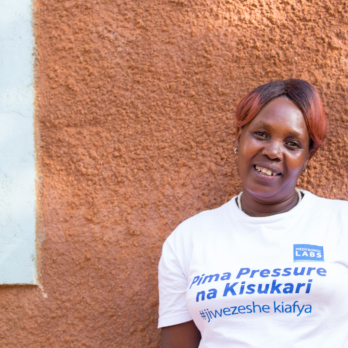On-the-ground work is one of the defining pillars of our work at Medtronic LABS. Thanks to our cross-sector partnerships spanning ministries of health to private technology companies and community health workers, we’ve situated ourselves in a uniquely rewarding position to enact real and measurable change for people living with non-communicable diseases across the globe.
Given the hyperlocal nature of our work, we would not be able to realize the same degree of positive outcomes without the direction of our passionate, driven teammates in the field who possess deep ties to the countries and communities most in need.
Hellen Lutta, Head of Field Operations, Tanzania for Medtronic LABS, is one such teammate. Ms. Lutta has been instrumental in developing and deploying Afya Imara, our proprietary care program for Tanzanian diabetes and hypertension patients. Read on to learn about her experiences, challenges, and learnings implementing Afya Imara across 21 health facilities and four regions in Tanzania.
You’ve been part of Medtronic LABS since our start in Tanzania. How have our programs and care evolved? What have you learned throughout this process?
I’m grateful for the opportunity to lead Medtronic LABS’s vision and mission in Tanzania. For the past 14 months, I’ve witnessed our Afya Imara NCD program grow from inception to achieving milestones, in just a few months’ time, already making a lasting, measurable impact on the lives of vulnerable communities.
Since its launch, Afya Imara has screened over 61,000 people for blood pressure and blood glucose and enrolled over 17,400 diabetes and hypertension patients into care across 21 health facilities in partnership with the Christian Social Service Commission (CSSC).
It’s been amazing to see how health facilities and Community Health Workers (CHWs) are embracing digital health for screening and managing hypertension and diabetes patients across these health facilities. It’s a testament to our process at Medtronic LABS and our commitment to facilitating systems-level change through strategic partnerships.
I first joined Medtronic LABS when we were transitioning from Empower Health to the SPICE platform. Through the process, I’ve learned how to lead through change.
As a leader, I’ve turned to the 3Cs (Communication, Collaboration, and Commitment) as my guiding principles to guide the team through both transition periods, ensuring seamless program expansion to four regions across Tanzania.
Through the process, I’ve learned the importance of a strong leadership team that appreciates adaptive programming, which has helped us succeed since Afya Imara’s inception. I am beyond thankful to Angela Massawe, Shiita Misambo, and Tukusuma Sikilili—they were the first three people hired for my team, and they showed relentless effort for this project. Afya Imara’s success has truly been a full team effort with support from both Global and Africa regional teams.
What are the major healthcare challenges for patients in Tanzania, and how do our programs overcome these challenges?
The major healthcare challenge for NCD patients in Tanzania is primarily a knowledge gap: specifically on NCD clinical guidelines among healthcare workers and NCD management among hypertension and diabetes patients.
Our program addresses this by training healthcare workers on NCD care and prevention using Ministry of Health (MoH) NCD guidelines. The program has invested in generating awareness and healthcare promotion activities through health talks during community outreach and NCD clinic days conducted by trained Community Health Workers (CHWs) and trained Healthcare Workers (HCWs).
This initiative has been integral to our strategy of promoting NCD awareness among patients and the general community. Through Afya Imara, we’re driving positive lifestyle changes and health-seeking behaviors. We also address beliefs and misconceptions about hypertension and diabetes management using non-clinical interventions.
Our work in Tanzania focuses on demonstrating how digital innovation is transforming health systems for patients living with NCDs and making care more accessible to all through our community work.
Now, we’re working to build a primary healthcare system that will digitally link communities with healthcare providers across various points of care. We work with trained CHWs under the Afya Imara program. We provide them with digital tools (e.g., a smartphone) and diagnosis equipment (e.g., blood pressure monitors, glucometers, and other consumables) to deliver quality community healthcare services via screenings, assessments, and referrals.
The linkage between CHWs’ digital tools and healthcare providers at health facilities allows diabetes and hypertension patients to have sustainable continuity of care.
Can you share a before and after Medtronic LABS site-specific example of how Afya Imara changed and/or improved clinician workflows, CHW support, and patient care?
The introduction of Afya Imara has brought a positive change in how CHWs refer hypertension and diabetes patients and the continuum of care through our digital platform-SPICE. There’s been a significant increase in diabetes (DM) and hypertension (HTN) patients attending clinics for medical review and follow-up across all 21 health facilities where we operate. By the end of January 2023, 78% of enrolled patients are currently active in care. Among hypertension patients who have completed 3 months in the program (n=9,038), 80% have both an enrolment and repeat BP. Among this sub-group, the proportion of patients with controlled BP increased from 29% at baseline to 48% at the end of January 2023. Among diabetes patients who have completed a similar duration in the program (n=3,013), 74% have an enrolment and repeat BG; the proportion with controlled BG increased from 42% at enrolment to 78% as at end of January 2023.
For example, one of the health facilities in Dar es Salaam (known as Buguruni Anglican Health Center) had no specific days for hypertension and diabetes clinics. Two months after the Medtronic LABS program implementation, they introduced clinic days for hypertension and diabetes twice weekly as they saw the value added to the hospital.
Moreover, the CHWs training on hypertension and diabetes screening has been critical in conducting daily community screening and referring patients to the facility for further follow-up. This initiative alone has increased hypertension and diabetes screening clients at Buguruni Health Center by 48%.
What are you looking forward to for the future of Medtronic LABS in Tanzania?
The future of digital health in Tanzania is promising and exciting. I believe digital tools like the SPICE platform will advance health equity by helping healthcare workers and CHWs reach the most underserved populations in ways that bridge healthcare gaps and eliminate geographic barriers.
There’s a lot of potential for future partnerships between Medtronic LABS, the Ministry of Health, and other partners across the health sector. I’m looking forward to seeing Medtronic LABS’s NCD program expand across all of Tanzania in the near future.
On-the-ground digital care meets measurable outcomes
We hope you enjoyed this Q&A session with Medtronic LABS Head of Field Operations, Tanzania, Hellen Lutta. If you enjoyed reading this conversation, please share it with your network. You can read our previous team member Q&As on our blog, along with other exciting insights and stories. Stay tuned for more team profiles in the coming weeks and months.
To get in touch with us, please visit our contact page. Together, we can transform global healthcare systems and deliver essential care to those in need.


